
A big band or jazz orchestra is a type of musical ensemble of jazz music that usually consists of ten or more musicians with four sections: saxophones, trumpets, trombones, and a rhythm section. Big bands originated during the early 1910s and dominated jazz in the early 1940s when swing was most popular. The term "big band" is also used to describe a genre of music, although this was not the only style of music played by big bands.
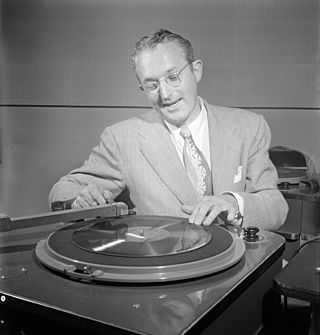
Thomas Francis Dorsey Jr. was an American jazz trombonist, composer, conductor and bandleader of the big band era. He was known as the "Sentimental Gentleman of Swing" because of his smooth-toned trombone playing. His theme song was "I'm Getting Sentimental Over You". His technical skill on the trombone gave him renown among other musicians. He was the younger brother of bandleader Jimmy Dorsey. After Dorsey broke with his brother in the mid-1930s, he led an extremely successful band from the late 1930s into the 1950s. He is best remembered for standards such as "Opus One", "Song of India", "Marie", "On Treasure Island", and his biggest hit single, "I'll Never Smile Again".
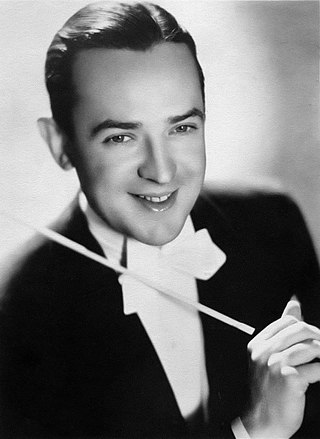
James Francis Dorsey was an American jazz clarinetist, saxophonist, composer and big band leader. He recorded and composed the jazz and pop standards "I'm Glad There Is You " and "It's The Dreamer In Me". His other major recordings were "Tailspin", "John Silver", "So Many Times", "Amapola", "Brazil ", "Pennies from Heaven" with Bing Crosby, Louis Armstrong, and Frances Langford, "Grand Central Getaway", and "So Rare". He played clarinet on the seminal jazz standards "Singin' the Blues" in 1927 and the original 1930 recording of "Georgia on My Mind", which were inducted into the Grammy Hall of Fame.
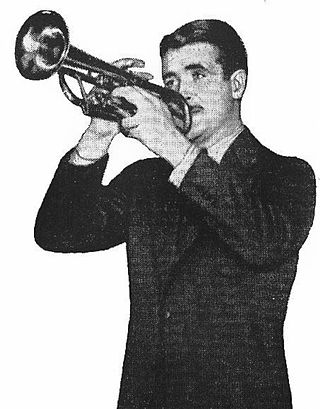
Roland Bernard "Bunny" Berigan was an American jazz trumpeter and bandleader who rose to fame during the swing era. His career and influence were shortened by alcoholism, and ended with his early demise at the age of 33 from cirrhosis. Although he composed some jazz instrumentals such as "Chicken and Waffles" and "Blues", Berigan was best known for his virtuoso jazz trumpeting. His 1937 classic recording "I Can't Get Started" was inducted into the Grammy Hall of Fame in 1975.
The swing era was the period (1933–1947) when big band swing music was the most popular music in the United States, especially for teenagers. Though this was its most popular period, the music had actually been around since the late 1920s and early 1930s, being played by black bands led by such artists as Duke Ellington, Jimmie Lunceford, Bennie Moten, Cab Calloway, Earl Hines, and Fletcher Henderson, and white bands from the 1920s led by the likes of Jean Goldkette, Russ Morgan and Isham Jones. An early milestone in the era was from "the King of Swing" Benny Goodman's performance at the Palomar Ballroom in Los Angeles on August 21, 1935, bringing the music to the rest of the country. The 1930s also became the era of other great soloists: the tenor saxophonists Coleman Hawkins, Ben Webster and Lester Young; the alto saxophonists Benny Carter and Johnny Hodges; the drummers Chick Webb, Gene Krupa, Jo Jones and Sid Catlett; the pianists Fats Waller and Teddy Wilson; the trumpeters Louis Armstrong, Roy Eldridge, Bunny Berigan, and Rex Stewart.
"I'm Gettin' Sentimental over You" is a 1932 song first released by the Dorsey Brothers Orchestra. It was recorded by Tommy Dorsey and His Orchestra in 1935, becoming his theme song. The lyrics were written by Ned Washington and the music was by George Bassman. It was first released in 1932 by the Dorsey Brothers Orchestra with Jean Bowes on vocals on Brunswick Records. The orchestra re-recorded it in August 1934 with Bob Crosby on vocals for Decca Records. The original copyright is dated 1933 and issued to Lawrence Music Publishers, Inc. The copyright was assigned to Mills Music, Inc. in 1934. Noni Bernardi, a saxophonist with the Dorsey orchestra arranged this song.
Joseph Anthony "Fud" Livingston was an American jazz clarinetist, saxophonist, arranger, and composer.

"Whispering" is a popular song published in 1920 by Sherman, Clay & Co. of San Francisco. The 1920 copyright attributes the lyrics to Malvin Schonberger and the music to John Schonberger.
"Indian Summer" is an American standard originally written as a piano piece by the prolific composer Victor Herbert. Al Dubin wrote lyrics for the tune in 1939, twenty years after Herbert wrote the tune.
"There'll Be Some Changes Made" ("Changes") is a popular song by Benton Overstreet (composer) and Billy Higgins (lyricist). Published in 1921, the song has flourished in several genres, particularly jazz. The song has endured for as many years as a jazz standard. According to the online The Jazz Discography, "Changes" had been recorded 404 times as of May 2018. The song and its record debut were revolutionary, in that the songwriters (Overstreet and Higgins, the original copyright publisher, Harry Herbert Pace, the vocalist to first record it, the owners of Black Swan, the opera singer for whom the label was named, and the musicians on the recording led by Fletcher Henderson, were all African American. The production is identified by historians as a notable part of the Harlem Renaissance.

Annie's Cousin Fannie, which is sometimes listed as "Annie's Cousin Fanny", is a 1934 song composed by Glenn Miller and recorded by The Dorsey Brothers Orchestra for Brunswick and Decca Records. The Dorsey Brothers released two versions of the song in 1934 and 1935.

Dese Dem Dose is a 1935 instrumental composed by Glenn Miller and recorded by The Dorsey Brothers orchestra.

Community Swing is a swing jazz instrumental composed and recorded by Glenn Miller and released as a Brunswick 78 single in 1937 by Glenn Miller and His Orchestra.
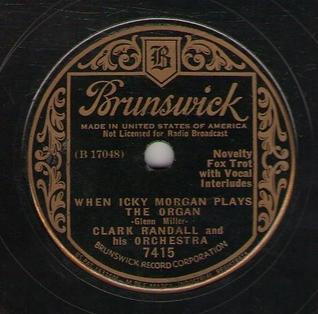
"When Icky Morgan Plays the Organ" is a 1935 big band and jazz song written by Glenn Miller. The song was released as a 78 single by Clark Randall and his Orchestra on Brunswick.

"Elmer's Tune" is a 1941 big band and jazz standard written by Elmer Albrecht, Dick Jurgens and Sammy Gallop. Glenn Miller and his Orchestra and Dick Jurgens and his Orchestra both charted with recordings of the composition.

"Tomorrow's Another Day" is a 1935 song composed by Glenn Miller for the Dorsey Brothers Orchestra. The song was released as a 78 single by the Dorsey Brothers Orchestra on Decca Records.

"Harlem Chapel Chimes" is a 1935 jazz instrumental composed by Glenn Miller. The song was released as an A-side 78 single by the Dorsey Brothers Orchestra.

'Bing and the Dixieland Bands is a Decca Records album by Bing Crosby featuring songs with a Dixieland flavour which was issued as a 10” LP with catalog No. DL5323 and as a 4-disc 78rpm box set (A-852) and as a 4-disc 45rpm set (9–232).
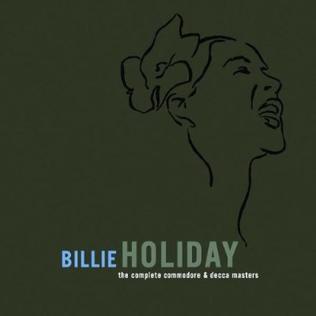
The Complete Commodore & Decca Masters is a 3CD box set of recordings by Billie Holiday, released by Hip-O Records in 2009, compiling all the master takes released as 78rpm singles by Commodore and Decca Records. It includes an essay by Ashley Kahn.















